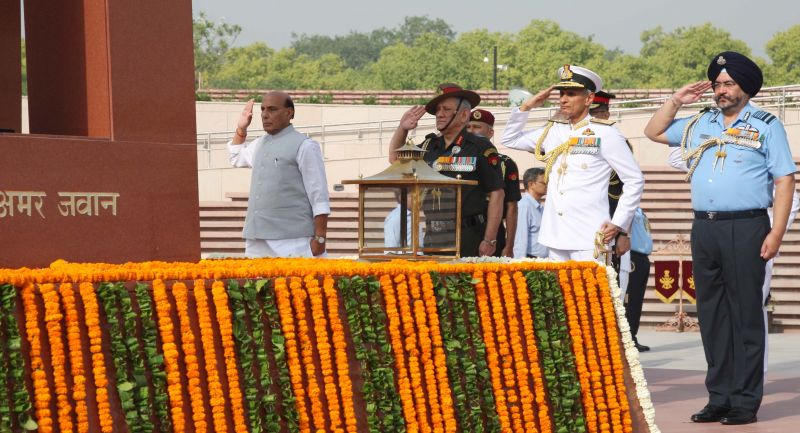Cyber, Space, SF agencies – not enough for future wars
By Brig Narender Kumar

National security is no more restricted to securing the physical boundaries and pursuing strategic interests but encompasses all aspects that have a bearing on the nation’s well-being. The capability development in land, sea and air will not suffice in future wars. The future threats are from air, land, sea, space and cyberspace. Winning a war requires integration across all five domains of warfighting. This integration is required to ensure robust command and control through communication and computing.
Integration of technology across all spectrums is assuming great relevance in future wars. India is already late in harnessing cyber, space, Special Forces and electronic warfare capabilities. China is pursuing the integration of all six domains to prepare to fight in multi-domain battlefields.
In fact, it takes decades to build warfighting capabilities, because it would require the formulation of doctrine, concept of operations, identifying capabilities to deal with the emerging threats, training of combat soldiers to deliver these capabilities in a war scenario and finally operationalization of the system in a theatre of war. China identified and absorbed lessons from the 1991 Persian Gulf War, which in its view demonstrated that “the new revolution in military affairs had moved from theoretical exploration into the phase of implementation drawing back the curtain on informationized warfare.
In 2015 China in a landmark military reformcreatedIntegrated Theatre Commands to fight wars on land, sea and air, Rocket Force for strategic nuclear and non-nuclear vectors and Strategic Support Force (SSF) that is responsible for space, electronic and cyber warfare.
India lacked integrated cyber, space and Special Forces commands to leverage the potential of the force multipliers that have the capabilities to alter the outcome of war and theatre battles. In fact, the armed forces wanted integrated commands for cyber, space and the Special Forces for more than a decade. It was delayed and deferred for a prolonged period and finally, the government agreed to sanction a scale down the dwarf structure of cyber, space and Special Forces agencies under two-star generals.
The bureaucracy saw it as a ploy by armed forces to get additional three-star generals, by missing the point that future wars will be driven by cyber, space and Special Forces in multi-domain wars and will become co-equal to conventional military capabilities. In fact, in many ways, multi-domain operations represent a more sophisticated conceptualization of joint operations.
Multi-domain wars are complex and the Higher Defence Organisation (HDO) ideally should have the understanding that multi-domain operations are “rapid and continuous integration of all domains of warfare essential to achieve decisive victory”.Cyber and electronic warfare ongoing conflicts that are unrestricted in time, space and geographical sphere. Non-kinetic means of war waging is like a bleeding enemy without it knowing who the enemy is. Therefore, it is not advisable to leave this battle space uncontested.
There is a need to understand that cyber, space and electronic warfare threat is not only from adversaries but it can also be unleashed by allies and neutral nations. In addition, cyber is becoming a potent tool for the states and non-state actors as well. Thus the threat remains ever evolving and ever-present whether a nation is at war or in peace with its neighbours. China is developing cyber, space and electronic warfare capabilities that have the potential to paralyse the entire war waging tools even before war begins on ground, air and sea.
Similarly, space command is required to protect own space assets and neutralize adversary’s space assets that have the potential to interfere in our communication and operations related systems. In future, even anti-satellite weapons may also be required to ensure hard kill of enemy satellites.
Likewise, cyber warfare is assuming a much greater influence on the outcome of wars. The US, China and Russia have achieved capabilities to paralyse air defence, disorient navigation/ guidance systems, destruction of critical switches of electrical grids, interference with control of power generation systems and communication grids.
In the same way, electronic warfare can jam the command, control and guidance system of aircraft, unmanned aerial vehicles (UAV) and missiles. Unmanned systems can be used to destroy undersea cables to put the entire internet system off. Similarly, the Special Forces have the potential to cause complete chaos and destruction by carrying out sabotage and physical destruction of critical infrastructure and disruption in the command and control network. Special Forces can also act as target designators behind enemy lines on vital static and mobile targets.
Credible capabilities are a declaration of putting capabilities in place and a strategy to signal that these tools of war will be part of the arsenal of India. It is a commitment that fire will be met by fire and any aggression in cyber, space and Special Forces domain will be responded with adequate force. Post Uri cross border operations by the Special Forces displayed that India has the capabilities and will to leverage these capabilities for good effect.
Considering the increased role in future wars, India must put in place a doctrine, concept of operations and training manual to prepare the trained and skilled warrior soonest. It is imperative to identify capabilities and focus to make in India critical cyber, electronic and communication equipment for security and reliability.
Notwithstanding the above, India, to begin with, should take the technological assistance from Israel and Japan. Once India has basic threshold capabilities in place, cyber, space and electronic warfare consisting of tri-services should be placed under a Tri-Service Command (Cyber, Space and Electronic Command) similar to what China has done for achieving synergy in cyber, electronic and space forces.
The Special Forces could subsequently be upgraded to a Special Forces Corps under a three-star separately. Putting these forces under the Integrated Defence Staff may be an ad-hoc arrangement at this stage. Because HQ IDS is more of a coordinating HQ between MoD and Services HQ especially with regard to inter-services issues. Thus to keep these agencies with HQ IDS will restrict growth and operational efficiency of these agencies. Therefore, India must plan to have a Tri-Services Command to look into the operational aspect of cyber-space, electronic and Special Forces. It is indeed a step in the right direction but this should be considered a baby step in view of the huge threat and potential of cyber, space and the Special Forces employment in peace and war.
China has gone in for a Strategic Support Force (SSF) an organization directly controlled by the Central Military Commission, headed by the Chinese president. Whereas the US has separate commands to deal with cyber, space and Special Forces commands. Putting in place cyber, space and Special Forces agency is delayed but a good beginning. It may not have the desired capabilities at this stage but these agencies depending upon the nature of threat can be enlarged. Establishment of these agencies has demonstrated that the intent to do us harm will be responded with equal intensity.
Notwithstanding the steps taken by the MoD after a pronged debate to create these agencies to develop capabilities for future wars, but there is a big question that the military and the ministry need to introspect and answer. Are future wars going to be fought on the basis of capabilities and structures decided by bureaucracy and political leadership who has little or no domain knowledge or they ideally should be decided by those who are going to spearhead these operations in war?
If later is true in that case why the military accepted a lame structure that by its very organisation is inadequate to meet the collusive threat from China and Pakistan. Let us be clear even in a war with Pakistan, Chinese assets of space, cyber and electronic warfare will be available to Pakistan and Indian organic capabilities in these three domains are grossly inadequate even after having created agencies that appears too little too late.
*Author is a distinguished fellow at the United Service Institution of India, New Delhi.



